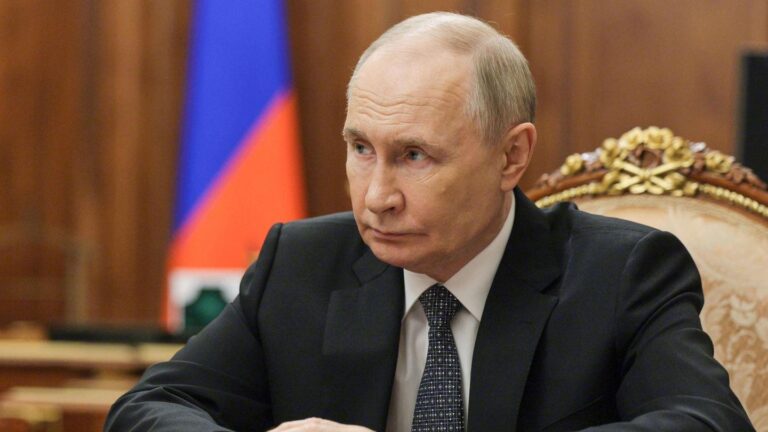Russian President Vladimir Putin has warned that recent U.S. strikes targeting Iran are driving the world toward a “very dangerous line,” escalating tensions in an already volatile region. Speaking at a recent press conference, Putin expressed deep concern over the potential consequences of America’s military actions, emphasizing the risks of further destabilization in the Middle East. The remarks come amid heightened conflict between the United States and Iran, raising fears of a broader confrontation with global implications.
Putin Warns US Military Actions in Iran Escalate Global Tensions
Russian President Vladimir Putin has voiced strong concerns over recent US military operations in Iran, warning that such actions risk pushing global relations toward a perilous tipping point. Speaking at a recent summit, Putin emphasized that escalating confrontations in the Middle East could have far-reaching consequences, destabilizing not only the region but also international peace and security. He called for restraint from all nations involved, urging diplomatic dialogue as the only viable path to de-escalate tensions.
Highlighting the broader impact, Putin pointed to several factors that contribute to the growing volatility:
- Increased military deployments near strategic locations
- Heightened risk of miscalculation between armed forces
- Potential for disruption to global energy markets
- Rise in proxy conflicts fueled by external powers
| Indicator | Status |
|---|---|
| US-Iran Direct Engagements | Increasing |
| Regional Stability | Declining |
| Global Oil Prices | Volatile |
| Diplomatic Channels Open | Limited |
Analyzing the Geopolitical Risks of US Strikes on Iranian Targets
The recent US military strikes on Iranian targets have significantly intensified geopolitical tensions, risking broader destabilization across the Middle East. Experts warn that these actions could trigger retaliatory measures from Tehran, complicating global diplomatic efforts. Key concerns include:
- Escalation of proxy conflicts involving US allies and Iranian-backed militias;
- Disruption of critical energy supply routes, impacting global oil markets;
- Heightened risks for international military personnel stationed in the region;
- Potential breakdown of ongoing nuclear negotiations and diplomatic engagement.
Analyzing recent statements from global leaders highlights the precarious state of international relations, with calls for restraint mounting. A snapshot of risk factors:
| Risk Factor | Potential Impact | Short-term Outlook |
|---|---|---|
| Regional Military Escalation | Increased clashes, destabilizing neighboring countries | High |
| Diplomatic Breakdown | Collapse of Iran nuclear talks | Moderate |
| Economic Disruptions | Volatility in oil markets, trade interruptions | Moderate |
| Global Security Threats | Expanded terrorism risks, cyber warfare | Low to Moderate |
With world powers now watching closely, the risk of crossing a “very dangerous line” remains palpable, marking a critical juncture in international relations.
Experts Urge Diplomatic Dialogue to Prevent Further Regional Destabilization
Global security analysts are raising alarms over escalating military actions in the Middle East, warning that continued aggression could lead to widespread instability across the region. The recent US strikes targeting Iranian forces have been described by officials, including Russian President Vladimir Putin, as dangerously provocative, pushing international relations to a precarious brink. Experts emphasize that without urgent diplomatic engagement, the risk of spillover conflicts increases, potentially drawing multiple countries into a broader confrontation.
Diplomatic efforts remain a critical tool to de-escalate tensions and ensure regional stability. Key voices from think tanks and international organizations advocate for the following measures:
- Immediate ceasefire agreements between involved parties
- Multilateral dialogue forums involving US, Iran, Russia, and regional allies
- Monitoring and verification mechanisms to prevent further outbreaks of hostilities
| Stakeholders | Proposed Role | Potential Impact |
|---|---|---|
| United States | Facilitate diplomatic talks | Reduce military tensions |
| Iran | Commit to restraint | Prevent escalation |
| Russia | Act as mediator | Build trust among parties |
| Regional Allies | Support peace initiatives | Strengthen regional security |
The Way Forward
As tensions continue to escalate, President Vladimir Putin’s warning underscores the volatile nature of recent US strikes on Iran and their broader implications for global security. With both sides entrenched in a complex geopolitical standoff, the international community watches closely, aware that further confrontations could push the region – and the world – toward a perilous breaking point. How this situation unfolds remains a critical concern for policymakers and observers alike.




